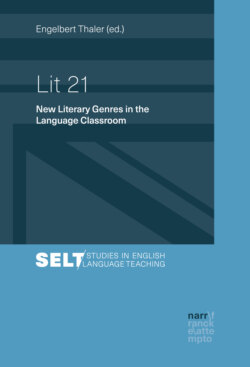Читать книгу Lit 21 - New Literary Genres in the Language Classroom - Группа авторов - Страница 18
На сайте Литреса книга снята с продажи.
4.8 Miscellaneous
ОглавлениеThis residual category not only results from being at a loss to find a common term for other types, but also reflects the diversity of today’s literary world.
Mythopoeia Greek for mythos-making, mythopoeia refers to a narrative genre where a fictional mythology is created by the author. Sometimes it comes as a series of epic fantasy novels.Example: A Song of Ice and Fire by George Martin (2011), turned into TV drama Game of Thrones
FanficShort for fanfiction, Fanfic is prose or poetry written by fans of a film, TV show or book featuring the person’s favourite characters. The products are posted online or published in a “fanzine” enabling a wide audience to share and discuss stories on the web. Typical characteristics of fanfic are its non-commercial use, intermediality, intertextuality, hypertextuality, and the transformation of the original.Example: the multitude of stories around Harry Potter
Progression LiteratureRepresentatives of progression literature put a heavy emphasis on the past, pursue (an often subjective) truth, imitate how people perceive time and events in their lives, and usually conclude with open-endedness, leaving readers to form their own ideas on the characters’ futures.Example: Me & Lee – How I Came to Know, Love and Lose Lee Harvey Oswald by Judyth Vary Baker (2010)
Flash Fiction Shorties, i.e. short narrative texts, are nothing new as Ernest Hemingway is said to have written the first piece with his 6-word story “For sale, baby shoes, never worn”. With the advent of the Internet, microfiction, however, has experienced a real boom (Botha 2016).Example: Shorties – Flash Fiction in Language Teaching by Engelbert Thaler (2016c)
BizarroThis genre of weird literature contains both strange and fascinating, thought-provoking and funny elements by depicting an unstable universe where the inexplicable becomes the norm and incongruities are made flesh.Example: Shatner Quake by Jeff Burk (2009), a novel about every character that Star Trek’s lead actor William Shatner has ever played
